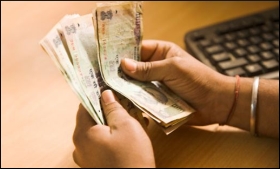|

|
Direct transfer of subsidies begins in 20 dist
|
|

|
|
| Top Stories |
 |
|
|
|
SME Times News Bureau | 02 Jan, 2013
The central government began the New Year by rolling out the ambitious
direct cash transfer of benefits covering seven welfare schemes in 20
districts across the country Tuesday.
Though Finance Minister P.
Chidambaram has described the move as a "game changer", the real test
would come in implementing the scheme.
The direct benefit transfer (DBT) scheme is aimed at cutting the bloated subsidy bill of Rs.1,64,000 crore.
It
is high in the Congress' scheme of things with party general secretary
Rahul Gandhi having told workers that if successfully implemented, it
could help the party win the next two Lok Sabha polls, including the
2014 elections.
"Such a scheme is being implemented by any
government for the first time in the country...Poor people will directly
get cash they deserve and there will be no middlemen...The scheme would
remove corruption to an extent," Congress spokesperson Rashid Alvi told agency .
The programme covers schemes like educational scholarship
for the Scheduled Castes and the Scheduled Tribes and pensions to
widows. Food, fertilisers, diesel and kerosene have been kept out as
these were complex issues, Chidambaram said.
India's welfare
spending is a major contributor to its fragile public finances. The
programme can generate much-needed budget savings by eliminating
corruption, the government says.
Chidambaram said that the party's slogan "aapka paisa aapke haath (your money in your hands)" was valid with the scheme.
"We
have a chance to ensure that every rupee spent by the government is
spent truly well and goes to those who truly deserve it," Prime Minister
Manmohan Singh had said.
The seven schemes that will now employ
direct cash transfers to beneficiaries' accounts are mostly related to
student scholarships, stipends and the Indira Matrutva Yojna.
It is estimated that at least two lakh beneficiaries will receive cash benefits from Jan 1.
Cash
benefits in the remaining 19 schemes will be available from February
and March when the government will cover 23 other districts across the
country.
"The purpose of direct benefits transfer is to ensure
that benefits go to individuals bank accounts electronically, cutting
down delays and diversions," said Information and Broadcasting Minister
Manish Tewari.
Chidambaram said credit transfer will take place
even if beneficiaries did not have Aadhaar card (bearing the Unique
Identification Number) and efforts would be made to ensure that Aadhaar
is seeded in every bank account in future.
The withdrawals could take place through saving accounts and ATMs.
The
government had originally identified 51 districts across 16 states to
be covered by the programme under which cash subsidy benefits will
directly go to the bank accounts of beneficiaries with mandatory
requirement of Aadhaar number.
Subsequently, four districts each
of Himachal Pradesh and Gujarat were exempted from the roll-out because
of the assembly elections.
The states being covered in the
initial phase are Karnataka, Maharashtra, Delhi, Rajasthan, Madhya
Pradesh and Punjab and UTs of Puducherry, Chandigarh and Daman and Diu.
This
will be extended to 11 more districts from February 1 in states
including Kerala, Haryana, Sikkim, Goa, Andhra Pradesh and Jharkhand and
12 more districts in states including Tripura from March 1.
Many
also fear that the scheme too could throw up stories similar to the
Nahatma Gandhi National Rural Employment Guarantee Scheme (MNREGS) which
has failed to deliver in several places. For example, pilot programmes
in Rajasthan and Jharkhand showed glitches with payments not reaching
those these were meant for.
Critics say the government has been
too quick in pushing forward the project and is bound to face enormous
implementation problems because of the complex technology and public
administration required.
They say the government's plan for
accelerated mass conversion of welfare schemes to Aadhaar-based cash
transfers could cause massive social exclusion. In which case it may not
be the game-changer for the Congress-led UPA in the next general
elections.
|
|
|
| |
|
|
|
|
|
|
|
|
|
|
|
|
|
|
| |
| Customs Exchange Rates |
| Currency |
Import |
Export |
US Dollar
|
66.20
|
64.50 |
UK Pound
|
87.50
|
84.65 |
Euro
|
78.25
|
75.65 |
| Japanese
Yen |
58.85 |
56.85 |
| As on 13 Aug, 2022 |
|
|
| Daily Poll |
 |
 |
| PM Modi's recent US visit to redefine India-US bilateral relations |
|
|
|
|
|
| Commented Stories |
 |
|
|
|
|
|
| |
|